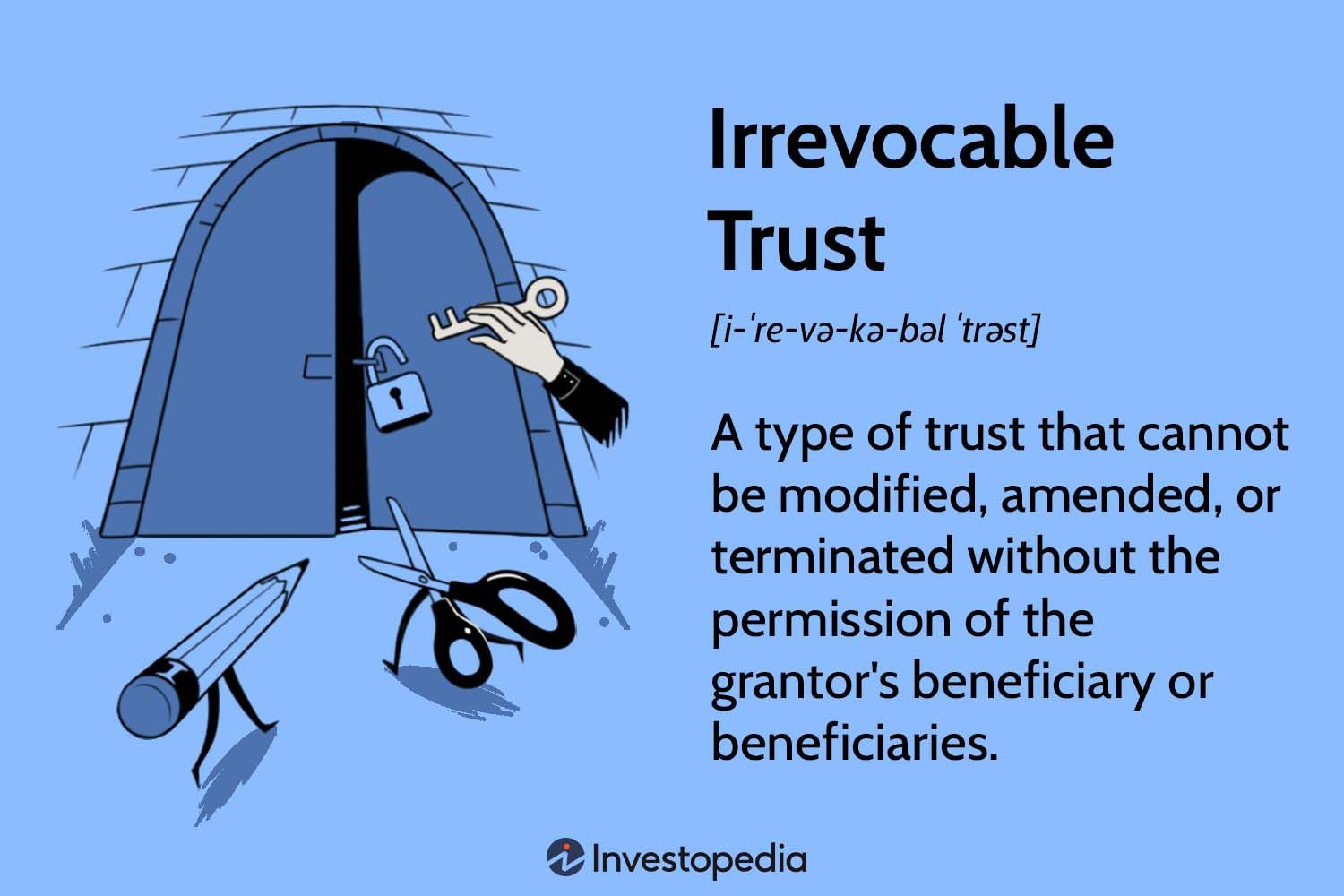Are you curious about what an irrevocable trust in estate planning entails? Look no further! In simple terms, an irrevocable trust is a legal arrangement that cannot be easily changed or revoked once it is established. It serves as a powerful tool for individuals looking to protect their assets and ensure the smooth transfer of wealth to beneficiaries. By understanding the intricacies of this type of trust, you can effectively navigate the world of estate planning and secure a solid financial future for yourself and your loved ones. Let’s delve deeper into the concept of an irrevocable trust and explore how it can benefit you.
What is an Irrevocable Trust in Estate Planning?
Estate planning is an essential aspect of preparing for the future, ensuring that your assets are protected and distributed according to your wishes. One powerful tool in estate planning is the irrevocable trust. An irrevocable trust is a legal arrangement that transfers ownership of assets to a trustee, who manages those assets on behalf of the beneficiaries. Once established, an irrevocable trust cannot be modified, amended, or revoked without the consent of all parties involved, making it a powerful tool for preserving wealth, minimizing taxes, and protecting assets from creditors.
How Does an Irrevocable Trust Work?
When creating an irrevocable trust, the grantor (the person creating the trust) transfers ownership of assets, such as property, investments, or cash, to the trust. The grantor appoints a trustee to manage those assets and make distributions to the beneficiaries in accordance with the terms of the trust. The grantor cannot serve as the trustee of an irrevocable trust, as it would undermine the irrevocable nature of the arrangement.
Key Parties in an Irrevocable Trust
In an irrevocable trust, there are several key parties involved. Understanding their roles is crucial to comprehending the functioning of an irrevocable trust:
1. Grantor: The grantor is the person who creates the trust and transfers ownership of assets to the trust. Once the assets are transferred, the grantor relinquishes control and ownership rights over them.
2. Trustee: The trustee is responsible for managing the trust assets and ensuring they are distributed to the beneficiaries according to the terms of the trust. The trustee has a fiduciary duty to act in the best interests of the beneficiaries.
3. Beneficiary: The beneficiary is the individual or entity designated to receive the benefits of the trust, such as income, distributions, or other assets, as specified in the trust document.
4. Successor Trustee: In case the original trustee becomes unable or unwilling to fulfill their duties, a successor trustee is named to take over the management of the trust.
5. Protector: In some cases, an irrevocable trust may include a protector, whose role is to oversee the trustee’s actions and ensure they adhere to the grantor’s intentions.
Purposes and Benefits of an Irrevocable Trust
Irrevocable trusts offer numerous advantages in estate planning. Let’s explore some of the primary purposes and benefits:
1. Asset Protection
Asset protection is a crucial aspect of estate planning, especially for individuals concerned about potential creditors. By placing assets in an irrevocable trust, those assets are no longer considered part of the grantor’s estate, making them generally unreachable by creditors. However, it’s important to note that there are certain limitations and exceptions to asset protection in an irrevocable trust, and seeking legal advice is recommended to fully understand the laws in your jurisdiction.
2. Tax Planning and Minimization
Another significant advantage of using an irrevocable trust is the potential for tax planning and minimization. Assets held in an irrevocable trust are typically not subject to estate taxes upon the grantor’s death. This can be an effective strategy for reducing the overall tax burden on an estate and preserving wealth for future generations.
3. Medicaid and Long-Term Care Planning
Irrevocable trusts can also play a vital role in Medicaid and long-term care planning. Medicaid, a government program that provides healthcare coverage for low-income individuals, has strict eligibility requirements. By transferring assets into an irrevocable trust, those assets may be excluded from consideration when determining Medicaid eligibility. This can help individuals preserve their assets while still receiving necessary long-term care benefits.
4. Control of Assets
Although the grantor relinquishes direct control over the assets placed in an irrevocable trust, they can still retain a level of control through careful design and selection of the trustee and terms of the trust. For instance, the grantor can outline specific conditions or purposes for which the assets can be used, ensuring that they are used in line with the grantor’s intentions.
Types of Irrevocable Trusts
Irrevocable trusts come in various forms, each serving different purposes and addressing specific estate planning goals. Some common types of irrevocable trusts include:
1. Life Insurance Trust
A life insurance trust allows the grantor to place a life insurance policy within the trust, removing the policy from their estate. This can help minimize estate taxes on the death benefit and provide liquidity to pay estate taxes or other expenses.
2. Charitable Remainder Trust (CRT)
A charitable remainder trust allows the grantor to donate assets to a trust while retaining an income stream for a specified period or their lifetime. Upon the grantor’s death or the designated term, the remaining assets in the trust are transferred to a designated charity. A CRT can provide income tax advantages and support charitable causes.
3. Generation-Skipping Trust (GST)
A generation-skipping trust allows the grantor to transfer assets directly to grandchildren or subsequent generations, bypassing their children as beneficiaries. This can help minimize estate taxes and provide for future generations.
4. Qualified Personal Residence Trust (QPRT)
A qualified personal residence trust allows the grantor to transfer their primary residence or vacation home to the trust while retaining the right to live in the property for a specified period. After the designated term, the property passes to the beneficiaries with potential estate tax savings.
5. Special Needs Trust
A special needs trust is designed to provide for individuals with disabilities without jeopardizing their eligibility for government benefits such as Medicaid or Supplemental Security Income (SSI).
6. Grantor Retained Annuity Trust (GRAT)
A grantor retained annuity trust is used to transfer appreciating assets out of an estate while still receiving an annuity payment from the trust for a specified term. This can help reduce gift and estate taxes, particularly in situations where the assets are expected to appreciate significantly.
Considerations and Limitations of Irrevocable Trusts
While irrevocable trusts offer numerous benefits, there are some considerations and limitations to keep in mind:
1. Loss of Control: Once assets are transferred to an irrevocable trust, the grantor relinquishes control and ownership rights over those assets. It’s crucial to carefully consider and plan for the potential loss of control.
2. Complexity and Professional Guidance: Creating and managing an irrevocable trust can be complex, requiring the assistance of an experienced estate planning attorney or financial professional to ensure compliance with legal requirements and maximize the benefits of the trust.
3. Modification Restrictions: As the name suggests, an irrevocable trust is typically unable to be modified or revoked. It’s essential to carefully consider the terms and provisions of the trust before establishing it.
4. Tax Implications: While irrevocable trusts can provide tax benefits, it’s essential to understand the tax implications and consult with a tax professional to navigate any potential tax considerations.
In estate planning, an irrevocable trust can be a powerful tool for protecting assets, minimizing taxes, and ensuring the smooth transfer of wealth to future generations. By understanding how irrevocable trusts work, the different types available, and the considerations involved, individuals can make informed decisions to achieve their estate planning goals. Consulting with a qualified estate planning professional is crucial to create an irrevocable trust that aligns with your unique needs and objectives.
Remember, estate planning is a complex topic, and the information provided here is for educational purposes only. It’s always recommended to seek guidance from a qualified professional to ensure your estate plan meets your specific requirements and complies with relevant laws and regulations.
DON'T Use an Irrevocable Trust Without These 4 Things
Frequently Asked Questions
Frequently Asked Questions (FAQs)
What is an Irrevocable Trust in Estate Planning?
An irrevocable trust is a legal arrangement in estate planning where the grantor transfers assets into a trust, and once established, the terms of the trust cannot be modified or revoked without the consent of the beneficiaries and the court. It is commonly used to minimize estate taxes, protect assets, and ensure their proper distribution according to the grantor’s wishes.
What are the advantages of an Irrevocable Trust in Estate Planning?
– Asset protection: Assets transferred into an irrevocable trust are no longer considered part of the grantor’s estate and are thus shielded from creditors and legal claims.
– Tax benefits: Irrevocable trusts can help reduce estate taxes, gift taxes, and generation-skipping transfer taxes, resulting in potential tax savings.
– Probate avoidance: Assets held in an irrevocable trust generally do not go through the probate process, leading to faster and more efficient distribution.
– Medicaid planning: By establishing an irrevocable trust, individuals can protect their assets from being counted towards Medicaid eligibility.
Who is involved in an Irrevocable Trust?
An irrevocable trust involves several key parties, including the grantor (the person creating the trust), the trustee (the person or entity responsible for managing the trust assets), and the beneficiaries (those who will receive the trust assets according to the terms of the trust).
Can an Irrevocable Trust be modified or revoked?
Unlike a revocable trust, an irrevocable trust cannot be modified or revoked by the grantor once it is established. However, certain changes may be possible with the consent of all beneficiaries and approval from the court.
What types of assets can be placed in an Irrevocable Trust?
Various types of assets can be placed in an irrevocable trust, including real estate, investment accounts, stocks, bonds, life insurance policies, business interests, and personal property. It is important to consult with an estate planning attorney to determine which assets are suitable for inclusion in the trust.
How does an Irrevocable Trust help in minimizing estate taxes?
By transferring assets into an irrevocable trust, the grantor effectively removes them from their taxable estate. This minimizes the overall value of the estate and reduces the potential estate taxes that would otherwise be owed upon the grantor’s death.
Can I be a beneficiary of my own Irrevocable Trust?
Yes, it is possible to be a beneficiary of your own irrevocable trust. However, it is essential to carefully structure the trust to comply with legal requirements and avoid potential negative consequences, such as the inclusion of trust assets in your taxable estate.
What happens to the assets in an Irrevocable Trust if I die?
Upon the death of the grantor, the assets held in the irrevocable trust are distributed to the beneficiaries according to the terms specified in the trust document. The distribution process is typically managed by the appointed trustee, ensuring the assets are transferred to the intended recipients.
Final Thoughts
An irrevocable trust in estate planning is a legal arrangement where assets are transferred to a trustee and cannot be amended or revoked by the grantor. This type of trust provides several benefits, including asset protection, tax planning, and control over the distribution of assets. By establishing an irrevocable trust, individuals can ensure that their assets are protected and distributed according to their wishes. In summary, an irrevocable trust in estate planning is a powerful tool that offers control and protection over assets for the benefit of future generations.



